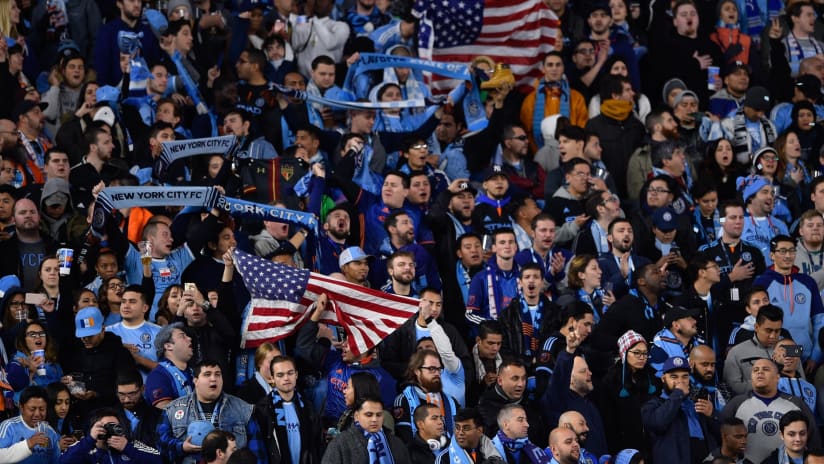In 2017, as in 2015, MLS will bring in two teams: one that’s already cultivated fans through other leagues (Minnesota), and one that has been created anew (Atlanta). And with teams, obviously, expansion brings new fans from a range of perspectives and situations.
Supporters’ groups prove particularly important for everyone involved. For teams migrating to MLS, they embody the existing history of fan support and help new fans learn the team’s particular brand of support. And for brand-new teams, they have been working (in some cases, before the team was even officially announced) to build that city’s fan culture.
For those in one of the potential new MLS cities curious about creating a supporters’ group, we spoke to representatives from four groups aligned with 2015 and 2017 expansion teams to get a better sense of what it takes to start and sustain an expansion supporters’ group.
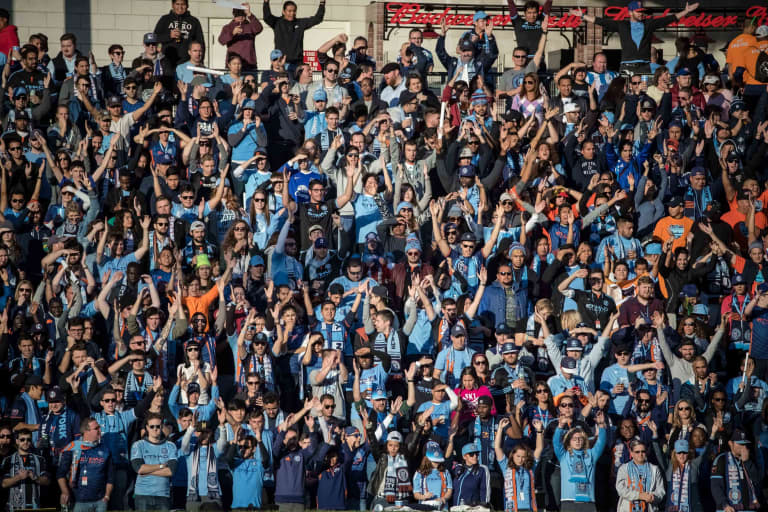
Photo via USA Today Sports Images
The Third Rail, NYCFC
Rox Fontaine, president
Origins
On May 21, 2013, the day of the official MLS announcement bringing NYCFC into the world, a group of prospective fans took to social media and organized a new supporters’ group. For their one-year anniversary, the fledgling group voted in the Third Rail as the official group name.
How they grew
Fontaine notes that initially, the new front office and SG “supported each other as they were both coming from nothing. The club helped raise the profile of the Third Rail, and vice versa.” Today, with both entities more established, “[they] are raising our own profile by playing to [their] biggest strengths which are social media engagement and event planning.”
Their relationship with the front office
“Our relationship with the front office developed very easily and naturally; we were the first,” Fontaine says. That continues to this day. “They truly support us and work with us to make our oddball situation as comfortable as possible.”
Three pieces of advice for those who want to start a supporters’ group
- “You have to be able to say no, and be okay with having said no. The exposure changes things and a group that used to be one thing or one way can change to another under the big lights.”
- “Don't be bound by old ideas. In our case, we're a brand-new team in a relatively new league, and there are any number of places to draw influence from. It can be difficult to push for new ideas and experiences when there is so much fixation on the way team X, Y or Z does or did things.”
- “Think long-term. It's very easy to get caught up in what's exciting right now, but long-term vision will separate the best from the rest.”
One thing you shouldn’t do
“You shouldn't think small.”
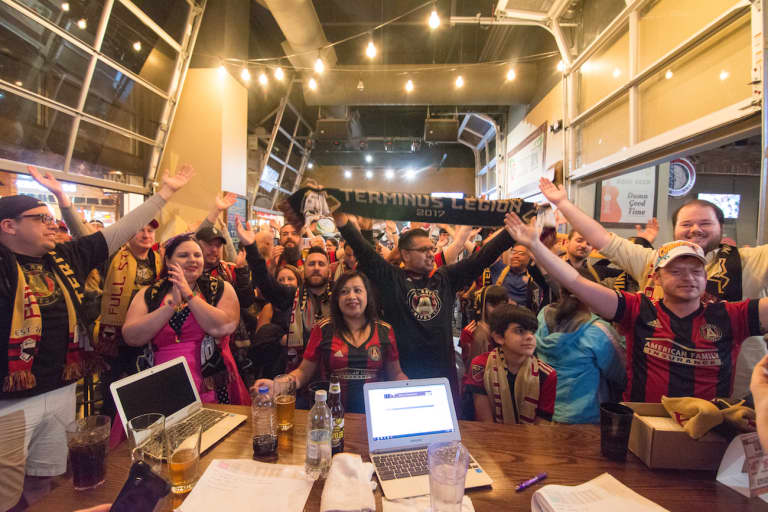
Photo by Lara Michelle
Terminus Legion, Atlanta United FC
Jorge Alonso, director of brand development
Origins
According to Jorge, Terminus Legion grew out of the “ATL Wants MLS” campaign, a fan-driven initiative in 2011 to demonstrate to MLS that soccer fans in Atlanta were ready for a team. More than 3000 signed the initial petition, and Terminus Legion launched as a group in support of Atlanta soccer in February 2014. That was just before MLS made the then-rumored announcement about an Atlanta team official.
How they grew
The drive to bring an MLS team to Atlanta gave them a database of potential fans from which to draw, but they’ve largely relied on social media to increase their presence and grow their awareness. Alonso notes they make sure they’re at parades and other city events, wearing Terminus Legion-branded scarves and shirts, and talking to those who want to know more about the group at those public events.
Their relationship with the front office
Alonso is proud of the relationship his group’s been able to forge there. Atlanta United has two employees who specifically work with Terminus Legion and the team’s other emerging supporters’ groups. They are able to email back-and-forth on matters in addition to holding regular meetings. And as Alonso proudly notes, “There are other people in the front office, including in the sales department, who are Terminus Legion members.”
Three pieces of advice for those who want to start a supporters’ group
- “Get your relationship with the front office going quickly. You’ll need contacts with the front office when you want to make things happen for your supporters’ group.”
- “Develop solid social media. It’s simply how news is communicated today, and it’s democratized media. We started early, and it’s helped us reach beyond our members.” While Terminus Legion officially has around 400 paid members, their Facebook page has 4000 members — some of whom they believe are future members waiting for the team to play its first match.
- “Find a charity to work with. It doesn’t have to be soccer-related, though with Soccer in the Streets, we were able to find one. There’s a legitimacy that gives you — it lets people know that you’re about something else.”
One thing you shouldn’t do
“Don’t alienate anyone. We’ve run across people who think we’re not [doing this] ‘correctly.’ But there’s not one correct way to do [a supporters’ group]. You don’t have to conform to any unwritten rules. It’s not a private club. There’s no secret handshake.”
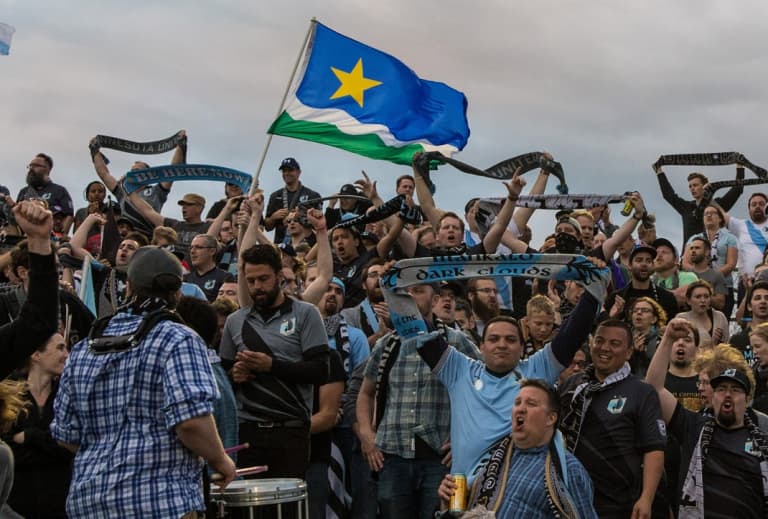
Photo via USA Today Sports Images
Dark Clouds, Minnesota United FC
Jim Oliver, president and board member
Origins
As Oliver remembers, the Dark Clouds started as a group of fans sitting behind the visitors’ bench at matches for the former Minnesota Thunder, who played in USL. The group name, a joke about fans aspiring to “ultras”-style support, grew to where one member of the group handed out buttons, each featuring a “fluffy black cartoon cloud,” says Oliver.
How they grew
Oliver notes that after the Thunder folded and the team then reorganized as an NASL-owned club, the fans decided they needed to act to help keep the team there. So they formed a governing structure and encouraged season ticket sales. They also coordinated transportation to home matches, as the team played in the National Sports Center in Blaine, a Twin Cities suburb.
Their relationship with the front office
Oliver notes owner Bill McGuire and president Nick Rogers saw Dark Clouds’ presence as an indicator that Minnesota would support an MLS team, once the team moved to the league.
“They've been working with us since they arrived on the scene. We actually have a business relationship because of our memberships being bundled with season tickets, so that helps keep us talking to each other productively,” say Oliver. “We're also working with the club, the city, and our temporary hosts at TCF Bank Stadium to make sure we can get as much supporters’ section action in that stadium as is practical.”
Three pieces of advice for those who want to start a supporters’ group
- “Make art.”
- “Throw parties.”
- “Don't listen to the armchair quarterbacking from trolls on the internet. It's super easy for people to pick apart what they do and don't like, and when you're working to get a couple hundred people standing together in public and yelling, you're making yourself a target for haters. But if you want to have an impact on the sport and your town, just focus on doing what's fun for the people around you and try to connect with those people.”
One thing you shouldn’t do
“Listen to people that tell you there's a right way to do this stuff.”
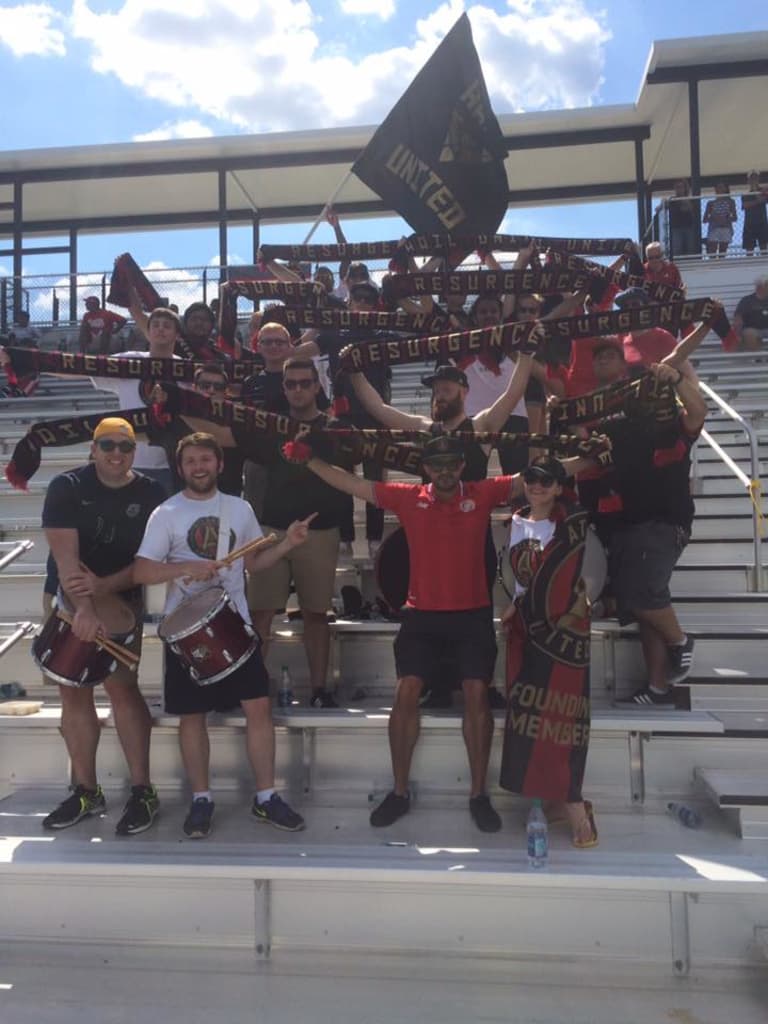
Photo via Facebook.com/ResurgenceATL
Resurgence, Atlanta United FC
Sam Veal, founder and board member
Origins
“Resurgence began in the summer of 2015 during a US match. I spoke with some friends about starting an SG that sort of brought an inclusive and ‘punk rock’ spirit to the game,” Veal recalls. “A small meeting with like minds was arranged, and it took off quite quickly from there. We knew from the very beginning who we wanted to be: focused specifically on the club and the city, low-key on merchandising and branding, and heavy on the game-day atmosphere. We wanted passion for the club and Atlanta to be what defined us.”
How they grew
Initially, they relied on word of mouth, though they branched out to invite people to watch MLS games with them, then created other events to attract prospective new members.”
Their relationship with the front office
Veal notes that the front office reached out to them, “and they asked all the right questions as to what our goals were, both on game day and long-term. They’ve kept us involved in every process, such as supporters’ section ticketing, tifo execution and storage, away match preparation, and inviting us to player announcements.”
Three pieces of advice for those who want to start a supporters' group:
- “Write down a mission statement and code of conduct. Codes of conduct can read like a list of rules and may seem a bit heavy-handed, but it’s important to understand that it is there to protect the members and not exclude. You don’t want to think that bad things can happen, but it’s important to be prepared for those moments.”
- “Let the club’s soccer culture happen. As we get impatient for match day one, it’s easy to try and force nicknames, songs, and other forms of identity. The speculation is fun, but when you allow things to happen organically, you often have traditions and songs that better reflect the city and club community. This is often a once-in-a-lifetime opportunity to sculpt soccer culture; take your time and enjoy the process!”
- “Be inclusive. People’s love of the game often has different origin stories, both big and small. It’s important to acknowledge these differences and keep focus on the common goal of the supporting the club. It may go without saying, but being inclusive also means providing a space for people of all differences to openly show their support. By embracing backgrounds and differences, you’ll have more positive voices creating local soccer culture.”
One thing you shouldn’t do
“Not listen to your members. Supporters’ group officers can do their best to form their group as much as they can, but members are the driving factor. Is there a song that the group likes that you didn’t plan for? Change your drum pattern! Create a logo that members aren’t crazy about? Take your time and find one that best represents who you are.
If someone in the group has a talent to lend that benefits all, be it graphic design, accounting, music, working with media, embrace the contributions! Our group represents several different nations, from Costa Rica to Bosnia-Herzegovina, and with so many talents and backgrounds to draw from, we really think that we have a group that will provide something as unique as Atlanta itself.”

